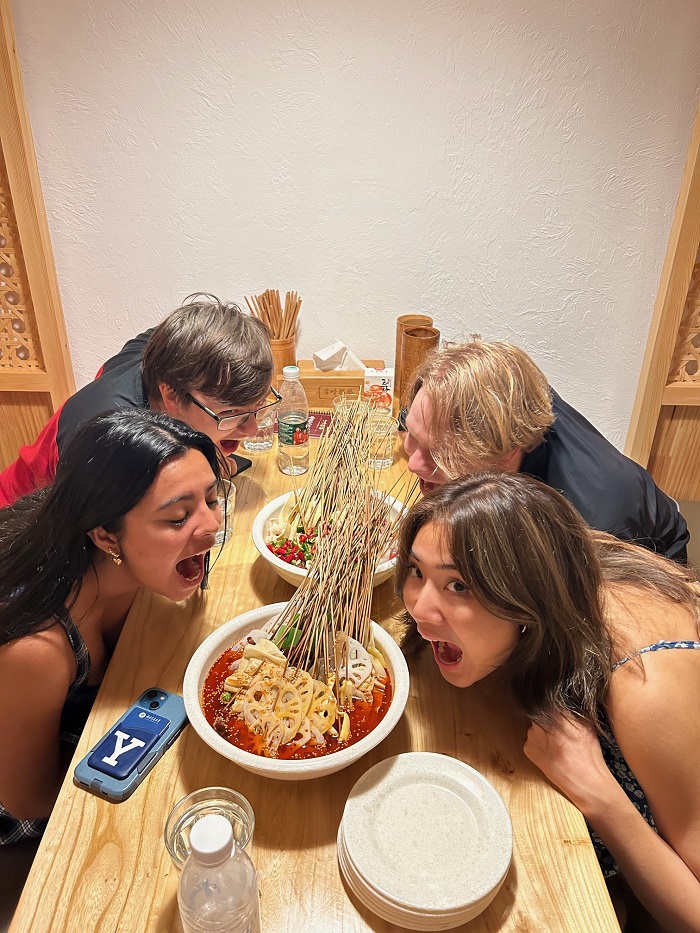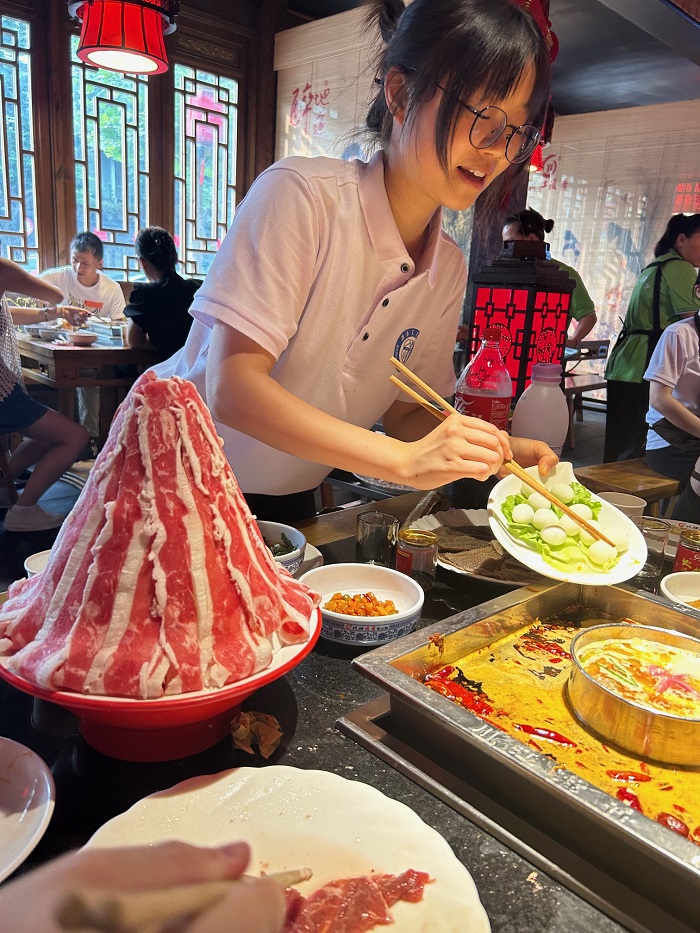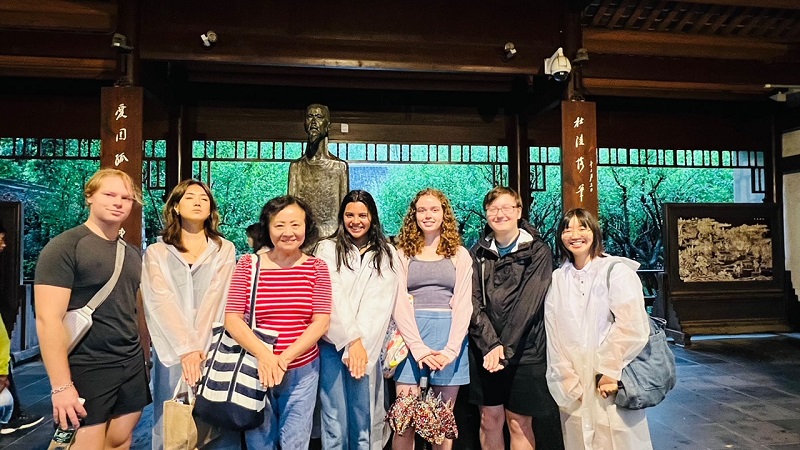Written by Laura Romig (Brown University), Student Correspondent for CET Beijing, Summer 2023
Time: Approximately 5:30 AM
Location: Chengdu, in China’s Sichuan Province
Sunrise splintered off rays between the dark, distant spikes of apartment buildings; the city yawned itself awake. We were huddled in front of the high-speed railway station, yawning as well, backpacks straps tugged tight and holding onto plastic bags with packaged bread and instant noodle cups, breakfast for the train. Before we could enter, however, our residential director patiently explained that we had meant to film a video in front of the train station upon our arrival, but in the haze of that moment five days ago, the task had been forgotten. So we would instead film the video now, we just had to say, with as wide-awake smiles as we could muster: “成都,我们来了” (Chengdu, we have arrived)! Then, paradoxically, having just announced our arrival, we would board the train to head back to Beijing, our home in China.
As I mouthed the words for the video, imagining myself asleep in the train seat, I had the sensation that the teachers, the program coordinators, maybe the whole city of Chengdu, had played a trick of nostalgia on us.
What trick? First of all, we seemed to have experienced the feeling in reverse. In class the days before arriving, our teachers had taught us about the city’s history, the panda conservation parks, and the Tang Dynasty poems of 杜甫 (Du Fu). And we were perpetually listening to or singing 成都, a ballad by artist Zhao Lei, which tells the story of two lovers walking through the streets of Chengdu, hands and hearts intertwined but always destined to part in the end. After soaking in this feeling of longing for days—which wasn’t nostalgia, exactly, because how can you feel nostalgia before an experience is complete?—we were finally allowed to announce our arrival in Chengdu. Then, like the couple in the song, we were bound by the logic of the story to part ways with the city and the new friends we had made there.

Giant pandas enjoying Chengdu’s relaxed and peaceful rhythm of life
In fact, the impending sense of nostalgia for Chengdu might have been quietly accumulating since the first day we arrived in China. After seeing the program-planned trip on the schedule left on my bedside table, my classmates and I were eager at the prospect of experiencing life in another city in China and connecting with students there. And, as an aside, after the trip concluded and we returned to Beijing, the experience also gave classmates and I enough knowledge and confidence to plan a trip for ourselves to the city of Xi’an, an experience of independent travel I highly recommend to anyone studying abroad.
But back to the beginning—I imagine if the city of Chengdu were personified, it would be split in two—the two lovers in the song, or two friends, wandering through streets lined with fresh fruit vendors, Mahjong and chess over tea, market stands piled with patterned fabrics, tables of families eating 串串 or chuan chuan, cold skewers in a spicy, mouth-numbing flavor combination, called 麻辣.

Ready to eat chuan chuan skewers!
One half of the couple is Chengdu’s traditional slow, peaceful rhythm of life, its teahouses and winding canals, and the casual amble of a giant panda. This lover can never leave Chengdu; she is the ancient spirit of the city, wind blowing in the thatched roof of Du Fu’s cottage, the memories kept in elephant tusks buried at Jinsha Archaeological Site. She is not just the city’s ancient history, either; I learned that Chengdu is thought to be an at-ease, tranquil alternative to the crushing pace of work and life in major metropolises like Beijing.
But then there is the other lover, the one who writes the love song to the city and to his partner, the one who always has to part, to move on to the next calling, the bigger stage or arena. He is the recent skyrocketing of Chengdu’s economic development, its calling card as a rising star city in China, attracting tourists like us and businesspeople alike. He is the 2023 World University Games happening in Chengdu right now, bringing college athletes from across the world to the capital of Sichuan Province; he is the frontier of mag-lev train research happening at Southwest Jiaotong University, where we stayed. In China, cities are unofficially tiered by the strength of their economic development; Chengdu, once an unassuming Tier 2 provincial capital sitting on a wealth of history, is now called a quasi-Tier 1 city, striving up toward the racing heartbeats of Beijing, Shanghai, and the like.
Is it the intense love between these two aspects of the city, and their star-crossed, irreconcilable futures, that conjured that intense feeling of longing? Why did listening to the song 成都 on the high-speed rail into the city have me gazing out the train window, wishing for a place I hadn’t yet seen, a love that wasn’t mine? On the train back to Beijing, I tried to think my way to an answer.
The song also describes the pair walking the streets of Yulin Community, or Jade Forest Community, an idyllic neighborhood centered around a clean, bright public square, shared canteen, and a community services center containing a small museum about the neighborhood’s history. I say idyllic because there is no other sufficient word: in the square, we saw children playing chess, older community members dancing and massaging their muscles, eager to explain the health benefits to us. Treetops branched overhead; a bookstore nearby sold local art and locally-published texts, postered with upcoming event flyers.

My roommate and I in the background of hotpot restaurant Haidilao’s livestream— It really happened!
CET not only took us to walk around the neighborhood; the program also arranged for us to attend a 交流 (exchange), in which, all in Chinese, a CET classmate interviewed three community members and planners, and then we were given a chance to ask questions. We attended a similar event for nearly all of the sites we visited—panda conversation experts for the panda park, archaeologists and artists for the dig site, business executives for the takeout hot pot livestream (yes, we were on a takeout hotpot livestream watched by millions of people—no time to explain). This type of exchange was not only an opportunity to practice Chinese listening and speaking but also allowed our understanding to go beyond the shallow appreciation of tourists; we actually got to talk to the people living and working at the places we visited.
And finally this, I think, these people moving along Chengdu’s currents, even more than the currents themselves, begins to explain the sense of longing I experienced there.
The end of the chorus of 成都 goes “成都,带不走的,只有你,” which could be roughly translated to “Chengdu, the only thing I can’t take with me is you,” the ‘you’ presumably being the lover the singer is talking to. The night before that hazy morning when we departed Chengdu, we said goodbye to our language partners, students at Southwest Jiaotong University majoring in teaching Chinese, who had led us fearlessly throughout the city, most of them Chengdu born and raised. They taught us words in the Sichuan dialect, recited Du Fu’s poems with us in the pouring rain, told us about their lives, and listened to us talk about ours as we searched for the best 川菜, the infamously spicy Sichuan cuisine.


My small group’s language partner, 杨清灵, helps us eat spicy Sichuan hot pot on the first night (left) and our small group at Du Fu’s thatched cottage in the rain (right)
Of all we experienced in Chengdu, for me, the hardest piece to leave behind were this friendship and connection we formed with the language partners during the tumultuous four days we were together, from eight in the morning until late at night each day. This is the best answer I’ve arrived at: maybe the sense of longing for what hasn’t yet been lost isn’t a trick, but just a simple love and care for people. People, who aren’t things or photos or memories we can carry with us—they walk away on their own paths, all of us in our own directions. In our classrooms, on the train, and on the streets of Chengdu, we were longing already for the connections to be made there with students just like ourselves. The people in the song don’t have to stand in for tradition and modernization; they can just be two lovers, two friends, two ordinary people. Chengdu, like all places, is just people at its core. And our hearts know, even if we’ve never been to a place, how to love the people there.